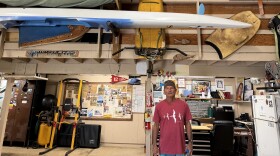The Federal Aviation Administration said Friday that it is setting up a new process for air tour operators in Hawaiʻi to be approved to fly at lower altitudes after numerous fatal crashes in recent years.
Current FAA regulations require air tour operators to fly at 1,500 feet unless they have authorization to go lower.
The agency said in a news release that it has outlined the new process for securing that authorization, including recommendations for pilot training, qualifications and aircraft equipment. The FAA said it will thoroughly review each operator’s safety plan before it issues an authorization.
“This process will help prevent situations where pilots encounter poor visibility and become disoriented,” said David Boulter, the FAA's acting associate administrator for aviation safety.
In 2019, a pilot and six passengers were killed when their helicopter crashed in turbulent weather near Kauaʻi's famed Na Pali Coast.
A National Transportation Safety Board investigation blamed the crash on the pilot’s decision to keep flying in worsening weather. The board also said the FAA failed to do enough to ensure that tour pilots in Hawaiʻi are trained in handling bad weather.
Also in 2019, three people died when a helicopter crashed on a street in Kailua.
And earlier that same year, a skydiving plane crashed on Oʻahu's North Shore, killing 11. Investigators blamed the pilot's aggressive takeoff for that crash.
U.S. Rep. Ed Case, a Democrat, cautiously welcomed the FAA's new steps.
“On first review, this seems to be a serious restart attempt by the FAA to address escalating air tour safety and community disruption concerns," Case said in an emailed statement.
But Case said “it remains to be seen” if tour operators will comply with the letter and the spirit of the initiative and whether the FAA will enforce it.
"But even if they do, the end solution is strict compliance with all safety requirements and strict regulation of time, place and other conditions of operation to mitigate disruption,” Case said.




